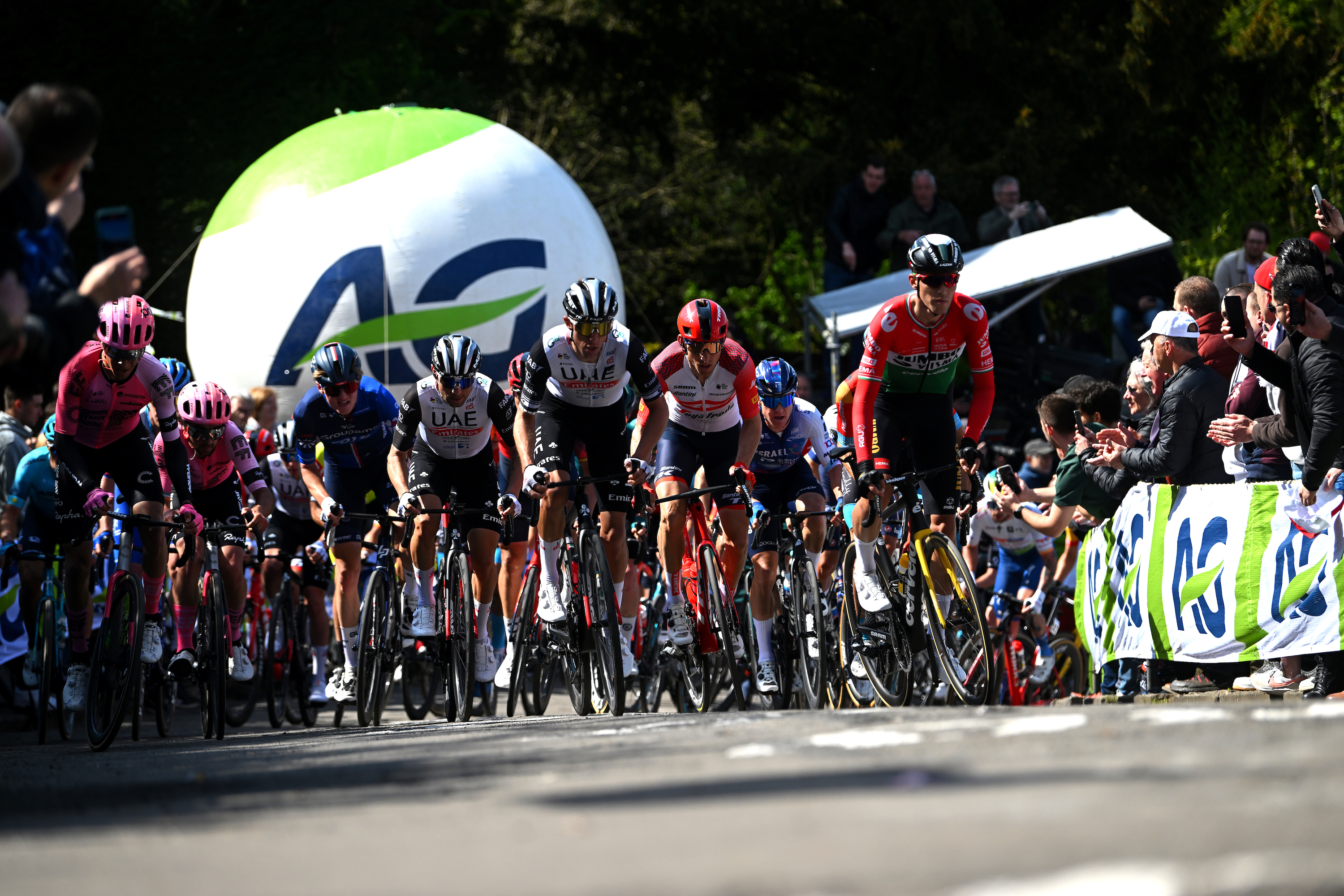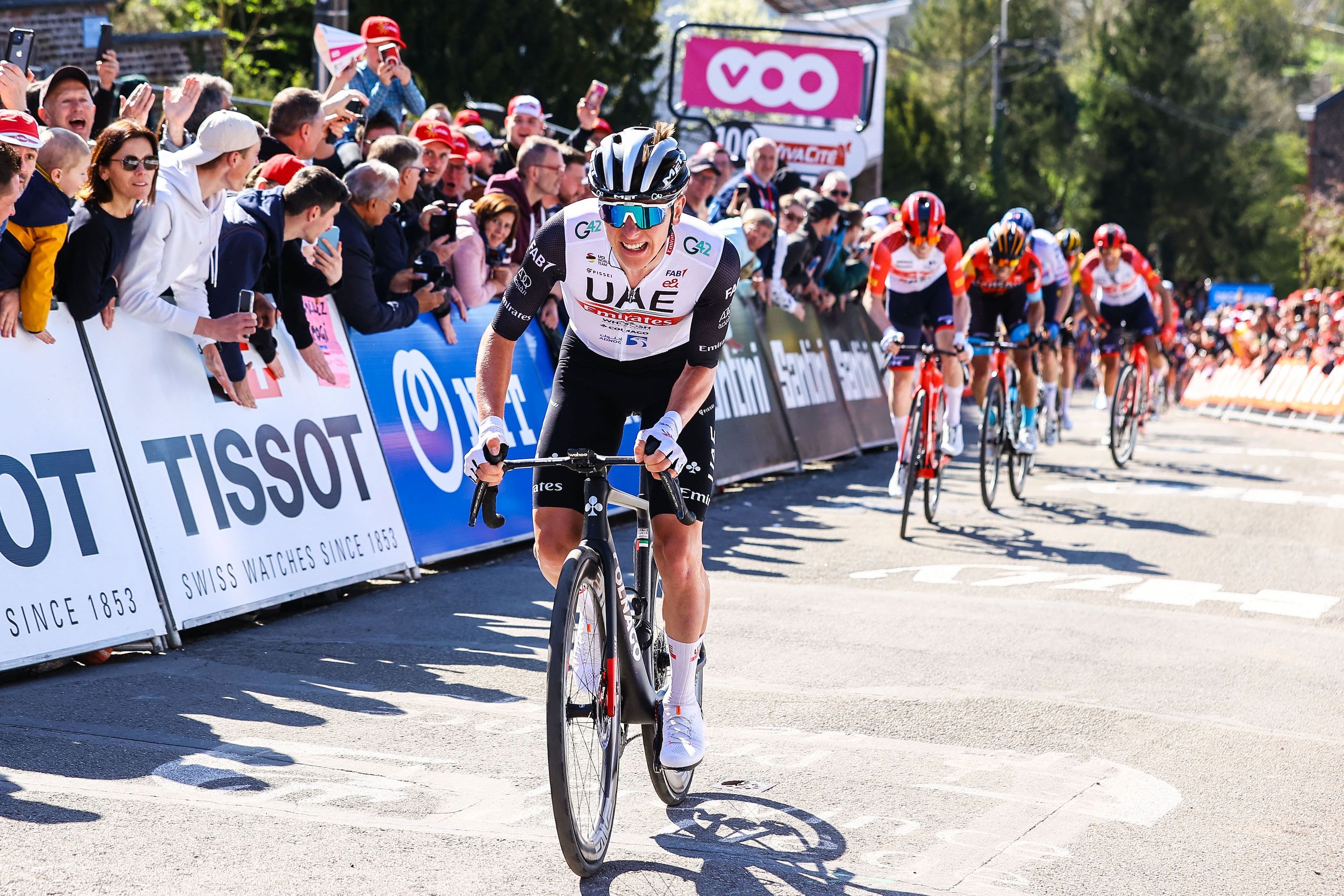
The Mur de Huy is one of the biggest inevitabilities in professional cycling. Since its introduction in 1985 as the finish for La Flèche Wallonne, the vertiginous road up to the Mont Mosan amusement park has almost always been the place where the Classic is decided, a habit that has been running for almost 30 years now.
This year, Tadej Pogačar has seemed inevitable. The UAE Team Emirates rider has tasted victory on over half the days he has raced, a frankly ridiculous sweep of races which covers everything from Paris-Nice to the Tour of Flanders.
Bike racing is not normally this simple. In a one-day race, the strongest rider does not necessarily win; any number of maladies or acts of misfortune can befall them, prevent that inevitable from happening. There are also 174 other riders intent on not letting that happen.
It is not as if Pogačar is performing his feats hidden, or away from the limelight. He is racing in front of the world, on its biggest stages, as Tadej Pogačar, the world's best bike rider, and still winning. Maybe he needs a flashing helmet to really alert his rivals to his presence, but this feels like too much.
Despite these inevitabilities, halfway up the 1.3km-long Mur de Huy on Wednesday, nothing had yet happened. Pogačar was on the front row, sure, but he hadn't blasted or slid away, as Demi Vollering had earlier in the day, the phoney war was still on.
100m further up the ridiculous incline, still no one had budged. Romain Bardet (DSM) attempted an explosive attack, but was boxed in. Israel-Premier Tech's Mike Woods tried to head off the front, but there was no gap.
It was as if everyone, while working at their absolute limit, had entered some kind of reverie, had forgotten there was just 300m to go of a WorldTour race.
It took Bardet, once he had escaped the prison that being on the second row is, to shake Pogačar out of his fast paced day dream, reminding him that he needed to attack to win.
At the 200m to go sign, as if on cue, the Slovenian lifted himself out of the saddle for the first time. As the road reached a gradient of 14%, Pogačar ground out his win: one bike length, two, then finally, time to celebrate.
His anxious checking of who was behind him in the final 50m revealed what was running through his mind; this is not a race Pogačar has mastered before, so could he be sure that his attack had neutered his rivals? Fortunately for him, it had.
"I left it all on the climb, it was super hard," Pogačar said post-race. "It’s a spectacular finish, what can I say."
Behind, Mattias Skjelmose (Trek-Segafredo) topped the Mur as best of the rest, followed by Mikel Landa (Bahrain-Victorious). Woods was fourth, Bardet ninth.

His UAE Team Emirates squad had worked all day to deliver him to that position, on the front row at the bottom of the Mur. All he had to do was do his thing, and surely victory would be his. Simple.
It shows how all-in behind Pogačar UAE were that their next-best placed rider finished 71st, Diego Ulissi, coming in 2-03 down.
"It gives me a lot of boost when the team does such an amazing job," Pogačar said. "A few times I watching the guys in front of me and thinking I have to pull it off or all the work was for nothing.
"Already 20km to go, or even with 50km, it was really nervous, but the team did a great job keeping me in the front. There was one moment where I almost crashed, it was quite hectic, but we really pulled it off.
"We obviously needed to pull from the beginning. Nobody really helped us. Ineos a little bit, but not too much. It was all on us. We wanted to make an even harder race in the end but the guys were a bit tired from pulling for 200km, but we still made a hard race, like we planned."
In a race like Flèche, effectively an uphill sprint finish, positioning is everything, so the work of a team behind one man is necessary to ensure he is in the right place at exactly the right point. For all of Alejandro Valverde's nous, this was what was behind his four consecutive victories at the race between 2014 and 2017.
Bardet looked strong, but was let down by being behind on the opening part of the climb. Of course, Pogačar probably would have won anyway, such was his strength.

Flèche was Pogačar's 12th win of the season so far, which has taken in the Clásica Jaén Paraíso Interior, the Ruta del Sol and Paris-Nice, and the Tour of Flanders.
The biggest disappointments? Fourth at Milan-San Remo and third at the E3 Saxo Classic, which is the sign of a pretty outrageous season.
However, the Slovenian had to dig deep to grind to victory up the Mur de Huy, which one could see on his face, and stressed post-race that he is not yet taking anything for granted.
"For everybody, you don’t get bored crossing the line first," he said. "I’m really enjoying that and grateful I have this moment with such a great shape. I’ll enjoy this moment while I can."
Just three riders have completed the Ardennes triple to date, the late Davide Rebellin in 2004, Philippe Gilbert in 2011 and, since there has been a women's equivalent of all three, Anna van der Breggen in 2017.
It should be noted that both Rebellin and Gilbert completed the feat while the Amstel Gold Race finished on the Cauberg, making it a race more suited to climbers more than puncheurs. Since 2013, Amstel has finished 1.8km from the top of this climb, making it much more winnable by punchier riders, like Mathieu van der Poel and Wout van Aert.
Pogačar is one of the only riders in the modern peloton can win across these varied courses, as shown by his victory at Flanders earlier this month, and at Flèche on Wednesday.
It would truly cement his place in history - already pretty assured, to be honest - if he were to win Liège on Sunday. The last rider to win La Doyenne after winning Flanders in the same season? One Eddy Merckx.
Pogačar, who has won Liège before, in 2021, was matter of fact about his next target post-race in Huy: "It's a different race with longer climbs."
The 24-year-old will go into the race with all the expectation, the peloton watching him, the pressure, but also the knowledge that none of this matters when you are the best bike racer in the world anyway. Simple. Pogačar is inevitable.







